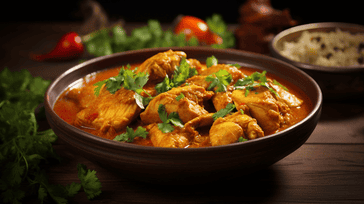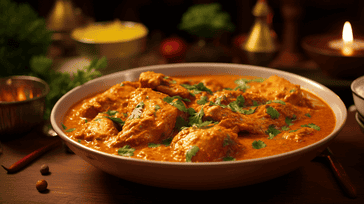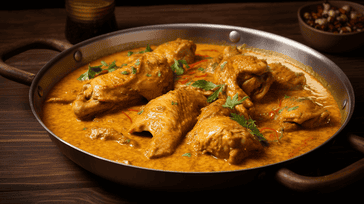

If you're looking for a dish that will warm you up and satisfy your taste buds, you can't go wrong with a chicken curry recipe. Whether you prefer it mild or spicy, homemade or authentic, chicken curry is a versatile and beloved dish with roots in Indian cuisine.
Not only is chicken curry easy to make at home, but it's also a crowd-pleaser that makes for a great meal any day of the week. With the right ingredients and techniques, you can create a creamy and aromatic chicken curry that will have everyone asking for seconds.
In this article, we'll explore the different variations of chicken curry, the key ingredients needed to make a perfect dish, and provide you with a step-by-step guide on how to make it. We'll also share tips on enhancing the aroma and pairing it with complementary sides, as well as discussing the health benefits of chicken curry. And, if you have leftovers, we'll offer creative ideas for using them in other dishes. Let's get started!
When it comes to comfort food, chicken curry always hits the spot. This beloved dish has its roots in Indian cuisine and has since spread worldwide. One of the reasons for its popularity is the ease with which it can be prepared at home.
Whether you're looking for an easy chicken curry recipe to whip up on a busy weeknight or want to explore the complexities of an authentic chicken curry, there's a recipe for everyone.
Chicken curry is a versatile dish that can be adapted to suit various preferences. From spicy to mild, there are many variations to choose from. The quest for the best chicken curry recipe is ongoing, with many chefs and home cooks experimenting with different techniques and ingredients.
So why choose chicken curry? For starters, it's delicious. The combination of tender chicken pieces, creamy sauce, and aromatic spices is a winning one. Additionally, chicken curry is a great source of protein, making it a healthy option.

Chicken curry is a versatile dish that can be customized to match your taste preferences. From spicy to mild, there are various ways to prepare and enjoy this popular Indian dish.
When it comes to spice levels, the options are endless. For those who enjoy a bit of heat, a spicy chicken curry recipe is the way to go. On the other hand, for those who prefer a milder taste, a creamy chicken curry might be a better fit.
To make the best chicken curry, it is essential to maintain authenticity. A proper Indian chicken curry recipe uses specific spices and techniques that are crucial to achieving an authentic taste. However, there is always room for experimentation and personalization to suit your preferences.
While there are many variations of chicken curry, finding the perfect recipe can be an ongoing quest. Some prefer their chicken curry to be spicy, while others favor a milder taste. The best chicken curry recipe will depend on individual preferences and tastes.
One popular chicken curry recipe includes the use of aromatic spices such as cumin, coriander, turmeric, and garam masala. These spices create a flavorful base for the dish, while the addition of tomatoes and cream provides a creamy texture. Of course, spice levels can be adjusted to match your preference.
For an authentic chicken curry, it is crucial to stick to the traditional spices and techniques. For example, a classic Indian chicken curry recipe often includes the use of whole spices such as cinnamon, cardamom, and cloves. These spices are added to the hot oil at the beginning to infuse their flavors into the dish.
Another popular variation is the use of bone-in chicken for a more authentic taste and texture. This method allows the bones to become infused with flavor and releases the marrow into the sauce, resulting in a richer taste.
Whether you prefer a spicy or mild taste, experimenting with different variations of chicken curry is an excellent way to explore the flavors and find your favorite recipe.
Chicken curry is a dish that's all about flavor, and the key to achieving a perfect balance of taste is in the ingredients you use. Below are some of the essential ingredients that will take your chicken curry from good to great:
| Ingredient | Description |
|---|---|
| Chicken: | Use boneless, skinless chicken breasts or thighs for this recipe. |
| Onion: | A finely chopped onion provides the base of flavor for the curry. |
| Garlic: | Crushed garlic adds depth and richness to the dish. |
| Ginger: | Freshly grated ginger adds warmth and a subtle spice. |
| Tomatoes: | Tomatoes provide acidity and sweetness to balance out the dish. |
| Coconut milk: | Use full-fat coconut milk for a creamy texture and rich flavor. |
| Spices: | A blend of ground cumin, coriander, turmeric, and garam masala provide the signature flavor of the dish. |
Don't be afraid to experiment with different spice combinations or to add additional ingredients like peppers, potatoes, or chickpeas to create your own unique version of chicken curry.

If you're looking for a quick and easy chicken curry recipe, look no further! With this step-by-step guide, you'll be able to whip up a delicious chicken curry in no time.
Tip: If you like your chicken curry spicier, feel free to add more cayenne pepper or chili flakes to your liking. You can also experiment with different vegetables such as potatoes, carrots, or bell peppers to add more flavor and texture to your dish.
One of the defining characteristics of a good chicken curry is its aromatic fragrance. The pleasant aroma can tantalize the taste buds and make the dish even more appealing. While there are many spices and seasonings that can be used to enhance the aroma of chicken curry, it's important to find the right balance between them to achieve the perfect flavor.
Some of the most common spices that go into a chicken curry include coriander, cumin, turmeric, chili powder, and garam masala. These spices lend the dish a warm, earthy flavor that balances the intensity of the chicken.
The key to using these spices is to roast them before combining them with the other ingredients. This process helps to release their flavors and brings out their natural oils. Once the spices have been roasted, add them to the chicken curry and let them cook together for a while to allow the flavors to meld together.
If you're looking to add some extra flavor to your chicken curry, consider using some secondary seasonings. Some popular options include ginger, garlic, bay leaves, cinnamon, and cardamom. These seasonings can add depth and complexity to the dish, taking it from good to great.
When using these seasonings, be careful not to overload the dish with too many flavors. It's important to strike the right balance to ensure that the spices and seasonings complement each other without overpowering the dish.
One of the great things about chicken curry is that there's no one "right" way to make it. Different spices and seasonings can be used to create unique flavor profiles that suit your personal preferences.
If you're feeling adventurous, try experimenting with different combinations of spices and seasonings to create a flavor that's truly your own. You might find that a pinch of this or a dash of that can take your chicken curry to new heights.

Chicken curry is a versatile dish that can be paired with a variety of sides to create a complete and satisfying meal. Here are some delicious options:
The traditional pairing for chicken curry is rice. Steamed white or brown rice is a great choice as it provides a neutral base that allows the flavors of the curry to shine. For an extra special touch, consider adding a pinch of saffron to the rice before cooking.
Soft and pillowy naan bread is a great choice for soaking up the rich, creamy sauce in chicken curry. It's also perfect for sopping up any leftover sauce on your plate. If you don't have access to naan bread, pita or roti bread are great alternatives.
To balance out the richness of chicken curry, consider pairing it with some fresh vegetable dishes. Steamed or roasted vegetables such as carrots, cauliflower, or green beans make great accompaniments. You could also serve a fresh salad on the side.
Don't be afraid to experiment with different side dishes to find the combination that works best for you. Whether you prefer traditional rice or something more adventurous like roasted sweet potatoes, the possibilities are endless!
Chicken curry is not just delicious, but it can also provide various health benefits to the body. Here are some of the ways that chicken curry can contribute to a healthy lifestyle:
While chicken curry can be a healthy and nutritious meal option, it's important to pay attention to portion sizes and ingredients, especially if you have specific dietary requirements or health conditions.
Consult with a healthcare professional or dietician if you have any concerns or questions about incorporating chicken curry into your diet.
There are endless possibilities for using leftover chicken curry in creative ways. Here are some ideas to inspire you:
Using leftovers in creative ways not only saves food from going to waste, but it also adds variety to your meals. Feel free to experiment with different combinations and see what works best for you.
Nothing brings people together quite like a warm and comforting meal. Chicken curry is a perfect dish to serve at gatherings and parties, as it is flavorful, easy to prepare, and can be adjusted to accommodate a variety of dietary preferences. Follow these tips to ensure your chicken curry is a hit at your next event:
When serving chicken curry as the main dish, plan on each person consuming about 1 cup of curry. If you are serving other side dishes, adjust the portion size accordingly. It's better to have too much than too little, as leftovers can be used in creative ways (see section 9).
Consider serving chicken curry in a large, decorative bowl alongside a platter of rice and naan bread. You can also add some chopped cilantro or a sprinkle of paprika on top for a pop of color. If you have individual serving dishes, consider portioning out the curry and rice ahead of time to make serving easier.
Chicken curry is a versatile dish that can be adjusted to accommodate dietary preferences. For example, if you have guests who prefer a vegetarian option, you can easily substitute the chicken for chickpeas or tofu. If you have guests who are gluten-free, make sure to use gluten-free ingredients such as tamari instead of soy sauce. Always make sure to label any dishes that contain allergens, such as nuts.
While the perfect chicken curry recipe may seem elusive, with a few tips and tricks, you can elevate your dish to new heights. Try these suggestions to perfect your recipe:
By following these tips, you'll be on your way to perfecting your chicken curry recipe and impressing your family and friends. Don't be afraid to make it your own and experiment with different flavors and ingredients.
Chicken curry is a delicious and versatile dish that can be enjoyed in a variety of ways. Here are some common questions about chicken curry, along with helpful answers and tips.
Leftover chicken curry should be stored in an airtight container in the refrigerator. It can be kept for up to 3-4 days. To reheat, heat on the stove or in the microwave until hot.
Yes, chicken curry can be frozen for up to 3 months. Be sure to cool the curry completely before freezing it in an airtight container or freezer bag. To thaw, place in the refrigerator overnight before reheating.
Chicken curry is often served with rice, naan bread, or other vegetable dishes. These sides complement the flavors of the curry and make for a satisfying meal. For a lighter option, try serving with a side salad.
Yes, chicken curry can be made with other meats such as beef, lamb, or goat. Adjust the cooking time accordingly for different meats, and consider how the flavors and spices will complement the meat.
If you prefer not to use chicken, tofu can be used as a substitute for a vegetarian option. For a non-vegetarian option, consider using shrimp or fish. Adjust the cooking time accordingly and ensure that the flavors and spices complement the alternative protein.
If you prefer a milder curry, reduce the amount of chili pepper or swap it for a milder variety. To increase the spice level, add more chili pepper or use a hotter variety. Remember to taste as you go, and adjust the spices to your preference.
Copyright © 2024 Taste Recipe. All rights by Taste Recipe.